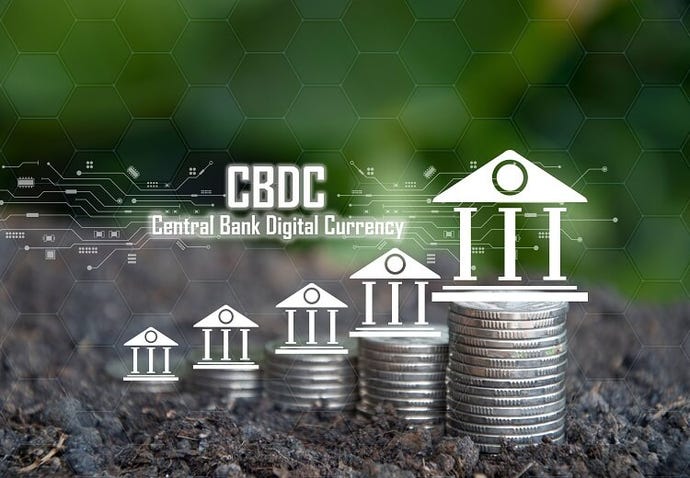

Does a Central Bank Digital Currency Make Sense?
source link: https://www.informationweek.com/fintech/does-a-central-bank-digital-currency-make-sense-
Go to the source link to view the article. You can view the picture content, updated content and better typesetting reading experience. If the link is broken, please click the button below to view the snapshot at that time.
Does a Central Bank Digital Currency Make Sense?

Like it or not, central-bank-issued digital currencies (CBDCs) are coming. China has already rolled out its “e-yuan.” EU officials are looking to release a digital euro by 2025. In the US, the Federal Reserve is currently studying the possibility of issuing a digital currency.
Central banks around the world are exploring potential use cases for CBDCs, with timelines for earliest deployment generally in the region of the mid- to late-2020s, says Jon Renshaw, deputy director of commercial research at finance and professional services firm NCC Group.
You’re in the (Digital) Money
Potential user benefits include pairing the flexibility and privacy of physical cash with the convenience of electronic payments, creating opportunities for future digital innovation in the payments space, Renshaw says. “However, challenges include privacy risks posed by electronic transaction ledgers, which may make it possible to de-anonymize the identifiers used for digital wallets and transactions.” Meanwhile, digital exclusion may, in certain cases, block parties from accessing their digital currencies.
CBDCs’ benefit to everyday consumers is creating an accessible cash-like instrument that doesn’t require access to a bank account. “Even the digital payment systems we use now, like Venmo or PayPal, require access to some kind of bank-issued form of payment, whether that’s a credit card, a checking or savings account,” says Jonathan Dharmapalan, CEO of CBDC advisory firm eCurrency. “Access to a government-issued digital currency would open opportunities for everyone.” He also predicts that CBDCs will create opportunities for innovation and entrepreneurship in the private sector, arising from the ability to create new financial products and services.
Dharmapalan believes that CBDCs could be a game-changer for people and businesses worldwide that don’t generally interact with the banking system. “A digital currency that operates in the same way as cash can be used through both bank and non-bank payment channels, and would be just as functional as the paper currency we are used to,” he says. Another benefit is that, unlike cryptocurrencies, a digital currency issued by a government entity wouldn’t fluctuate in value, making it far more reliable than its less regulated digital counterparts.
Creating a safer, more secure form of digital money that’s an alternative to using privately-issued digital money is a key reason spurring the interest in CBDCs, says David Creer, crypto and e-money lead at technology and business consulting firm GFT. For both central and commercial banks, the technology promises simpler cash management. The technology also opens the door to quicker, simpler, and cheaper cross-border remittances, and a greater understanding of how people are using e-money, he says.
In the wholesale space, Renshaw notes that potential benefits include improving the speed of interbank transactions, speeding foreign exchanges, and reducing the amount of currency that’s currently tied up in pending transactions, all made possible by to the ability to introduce atomic transactions involving multiple financial institutions. “Potential risks include systemic changes to interbank transactions requiring changes to business models, and in the worst cases, potentially leading to possible financial instability,” he adds.
Failure and Inconsistencies
On the downside, CBCD could expose businesses and consumers to technology failures and inconsistencies, says Efraim Chalamish, a senior advisor at risk and financial advisory firm Kroll. “People ... may be reluctant to participate in the transactions due to privacy concerns and potential taxation,” he explains. “Ordinary businesses will have to comply with additional regulation derived from central banks’ digital currencies’ requirements,” he states. Businesses will also have to provide information, if required to do so, as well as support any government efforts to tax related assets.
Conner Murphy, vice president for strategy at blockchain platform developer SKALE Labs, believes that CBCD’s risks greatly outweigh any short-term benefits. “Adoption of CBDCs risks setting a precedent akin to censorship,” he warns. “In this case, a central institution controls the flow of funds, the same way as with information.” Such centralization, he explains, could inadvertently diminish individual financial autonomy -- the opposite of decentralized currencies, such as Bitcoin or Ethereum, that enable individual ownership and data privacy.
Yet critics’ concerns aren’t likely to slow CBDC deployment. Dharmapalan observes that besides China, countries currently rolling out CBDCs include Jamaica, India, Nigeria, and the Bahamas. “Many more are soon to follow,” he predicts. Dharmapalan notes that according to data from the Atlantic Council, a US-based international affairs think-tank, there are currently 130 countries worldwide at various stages of a CBDC development, representing 98% of global GDP.
What to Read Next:
Worldcoin Eyes Biz Users as Biometric Crypto Rises
AI, Data, and Crypto in Play at Fintech Innovation Lab Demo Day
DOS Won’t Hunt: SEC Sues Crypto Exchanges Coinbase and Binance
Recommend
About Joyk
Aggregate valuable and interesting links.
Joyk means Joy of geeK